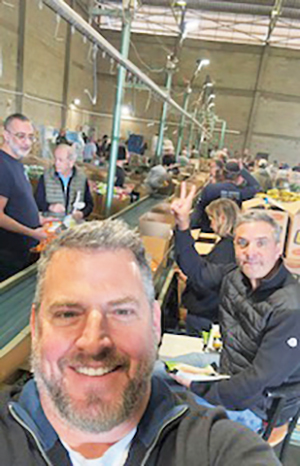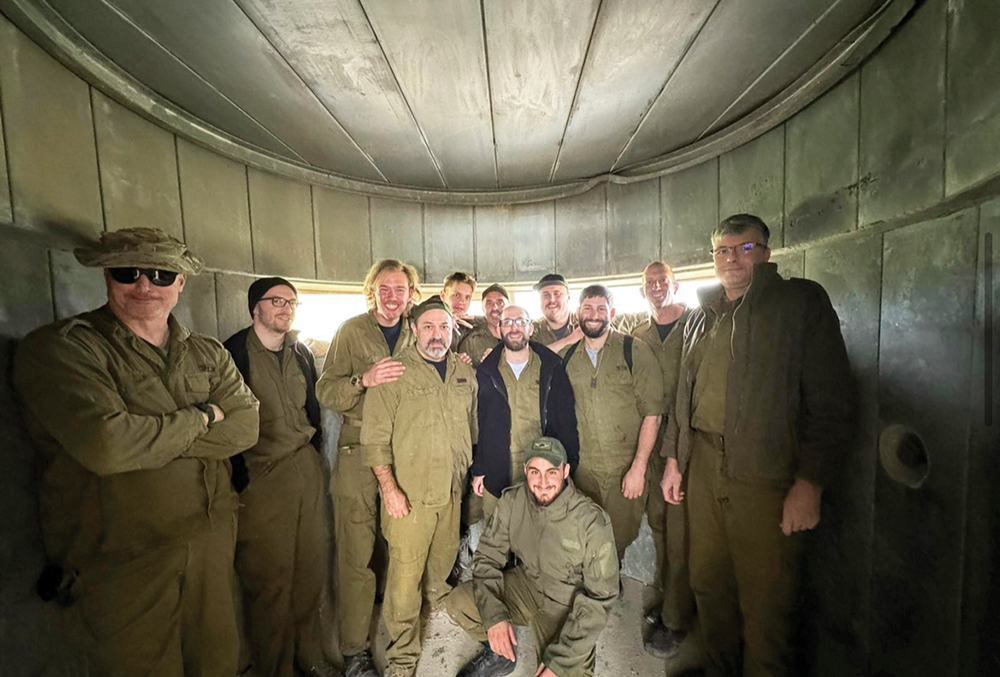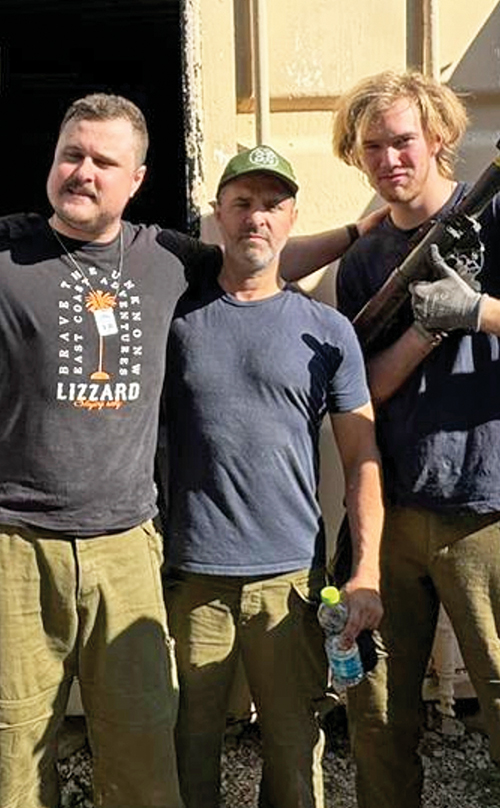
David Glass, 50, of Fort Lauderdale and West Hampton, is self-employed in finance and has a son in college. Consequently, when he was deeply disturbed by the events and aftermath of October 7, he was able to create a window to pick up and leave his life for three weeks to volunteer in Israel.
Glass was raised in a Modern Orthodox household with a strong connection to Israel. His grandmother moved to Netanya when he was young, and his family would visit her in the summer. After high school, he attended Neveh, a yeshiva in Israel, for a year. Glass went to Israel with his son last summer to attend his niece’s wedding (his sister lives there with her husband and 10 children), but before that he hadn’t been to Israel in over 25 years.

When Glass took in the global reaction to the events of October 7, he Googled “volunteer in Israel.” His first choice was to be in combat. He emailed agencies, telling them he was ready and willing to fight, but was told that wasn’t possible. He said he would do anything at all to help. He connected to the Sar-El program, which organizes supporters from around the world to assist on IDF bases in a logistical support capacity. The program was experiencing a flood of volunteer applications, and Glass felt desperate to join. He applied, got a physical exam, made phone calls and eventually was accepted.
“I needed to be there,” Glass said. “As a consumer of the news, I would see that three more soldiers were killed in Gaza, and then I would see that South Africa is accusing Israel of genocide, and what could I do? ‘Like’ a post on Twitter? That doesn’t do anything. Write a check? That is helpful, but I don’t feel the help. There was no other choice for me. I was antsy. I had to be there and actually get my hands dirty.”

For the first week of his three-week volunteer mission, Glass was stationed with a group of 100 volunteers at an army base in Be’er Sheva, in the south. He was surprised to see that many of the volunteers weren’t Jewish, and of those, only a small percentage were Orthodox Jews. But the Jews he was working with, while not Orthodox, were very connected to Judaism.
The base was busy and full, so the volunteers had to sleep in a Bedouin tent nearby. “Coming from a condo in Fort Lauderdale to a Bedouin tent with 20 other guys, and a single bathroom 40 yards away, I was in shock,” Glass said. He forced himself to adapt to the accommodations, and got to work.
The work for Week 1 was on an assembly line, putting together meals to be shipped out to the soldiers. The scale of the operation was astonishing. Glass couldn’t understand how there was such a large demand for tortillas. The volunteers would work methodically for hours straight.
“It was repetitive work,” he said. “I found it therapeutic. It makes you forget your problems.” The volunteers would chat all day, and by the end of each day, Glass felt like he knew everything about the people with whom he had worked.

The volunteers ran the assembly line for nine hours a day. They ate meals alongside the soldiers, and Glass remembered the feeling of eating his Israeli salad with the M-16 of the soldier next to him poking into his ribs.
Most of the group that week was European, including many French and Italian volunteers. However, one day, Glass found himself surprised at how much he had in common with the man next to him. Both were named David, and had been raised as Modern Orthodox Jews in the New York area. They had attended many of the same religious institutions, and enjoyed comparing notes and playing “Jewish Geography.”
Glass’s second week was a completely different experience, and the highlight of his three weeks in Israel. He was assigned to a small group of only seven people. They became close and truly got to know one another. The group consisted of four men and three women.
The accommodations were also different. The volunteers slept in the dormitory of Kiryat Moriah University in Jerusalem. In the dining room, there was a working cappuccino machine. This was funny for Glass to discover because during the first week he had joked, “Where can I get a cappuccino around here?”

Every morning the group took a bus to Tel Aviv, where they sorted and packed medical supplies. There were many volunteers who would come for just the day, including American college students.
Glass was impressed with the American students. They came from universities such as Cornell, Brandeis and University of Maryland. They were hard workers and self-starters. Their Hebrew was strong, so they often served as liaisons between the Israelis and Glass’s group of seven, who barely spoke Hebrew.
Again, Glass was floored by the scale of the operation. Hundreds of thousands of different types of medicines passed through his hands, and he couldn’t believe that there was a need for so many. “In any army, there are a whole bunch of people supporting each soldier,” he noted. “Someone has to put together the kit with the Advil, bandages, antacids and lip balm.”
He and his six cohorts became close as the week progressed. He loved that they were a diverse group, from different walks of life.
Phil Newman, Glass’s roommate for the week, is from Portland, Oregon. He climbed Mount Kilimanjaro in Africa with his son at age 49. Newman couldn’t get over the antisemitism in Portland after October 7, and spent time ripping down pro-Hamas posters. In line with the common theme Glass was seeing, Newman’s shock at the overt antisemitism propelled him to volunteer.
Elyse Silver, 52, is a public school gym teacher from Tampa, Florida. She had to raise money from friends to pay for her ticket to Israel, and she signed up for four weeks. She begged her high school to let her take this leave of absence. Glass noted that Silver had a very strong work ethic, never seemed frustrated or tired, and remained enthusiastic the entire time.
Ami Dodson is from San Francisco. She is a cantor at her Reform synagogue, and sends her son to a private school in the bay area.

Rebecca Fleischer is a collections attorney from Fort Lauderdale, Florida. As she worked, she continually posted on social media. She even started making connections for Sar-El on her social media platform.
Dr. Jackson Streeter, from Gainesville, Florida, had been on Glass’ base during his first week, but because there were so many people there at the time, the two didn’t connect. Streeter had served in the U.S. Navy where he became the first navy flight surgeon to be selected as a TOPGUN (Navy Strike Fighter Tactics) instructor. He is now a life science expert who works in DeepWork Partners and is the director of ventures at the University of Florida. Glass noted that Streeter was more private and humble, but the two slowly bonded, and when they parted, as the doctor was going to return to the States, he gave Glass his pocketknife and told him to give it to an Israeli soldier.
Vaughn, from eastern Michigan, is the tallest Jew that Glass ever met. At 6’8”, Vaughn has played in NCAA tournaments twice. After his work on Sar-El, Vaughn continued volunteering on a kibbutz near Gaza where he has family. Like Elyse, he also had a hard time leaving his work to volunteer. He had told his boss that this was non-negotiable, and that he was willing to be fired if necessary.
The group got so close that when the week was over, they spent the weekend together. They created a WhatsApp group, and continue to keep in touch.
After the second weekend, Glass went on to his third and final week. This was the most difficult and physically taxing. He was assigned to a base near Haifa. There was a sudden need for strong men to build parts for a new training army base that had to be set up quickly. Glass was assigned with 11 other men, and was the oldest of the group.
He was part of a young, all-male team who had to carry heavy loads all day, bringing bunk beds out of trucks and walking through mud to set them up. They unloaded 18-wheelers all day. They did it in the rain, and even in the dark one evening. The work was back-breaking.
Again, Glass was shocked at the conditions. The showers were communal, and the toilets barely flushed. His group slept with the soldiers in a tent with 100 bunk beds that were standing in mud.
Glass noted that this was the only week he felt close to being a real soldier. Every day the volunteers stood in a lineup with the soldiers after breakfast, with their hands behind their backs, chests out, hats off, while raising the flag and singing “Hatikvah.”
In his group of 12 men, half were not American, and five were not Jewish. The group included an investment banker from New Jersey, a 30-year-old South African, a colonel from Australia’s Special Forces, a Hungarian and two German men in their 20s.
“Seeing the non-Jewish people there was so moving,” said Glass. “There’s such a feeling of us being abandoned by the world when you look at social media. You see reasonable people retweeting Nazi propaganda and you wonder: Is the world abandoning us before our eyes? Seeing these people brought back hope.”
Glass shared that after these three weeks, his connection to Israel is very strong, and he plans to return next year.
He turned 50 during the second week of his volunteer experience. His group of seven was finished for the night and looking for a place to get ice cream. Glass announced to his friends that it was his birthday, and told them going for ice cream after a long, hard day of work volunteering for the Israeli army was the best birthday he had ever had.
“I truly think that people in my situation—comfortable, middle-aged people living in the States—instead of another beach vacation, they should take a week or two and go to Israel to help. Yes, you will live in conditions that you haven’t experienced since you were young—or ever—but it will change your life. Plus, you will meet random people from all over the world that you will connect with and realize you have common ground with. If you get back from the Bahamas on Monday, you won’t remember much of it by Tuesday. But this is an experience that will be etched in your memory forever.”
Dassi Lewis is a staff writer at The Jewish Link.












